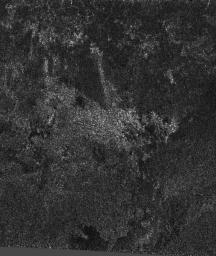
|
Follow the Arrow
- Click the image above for a larger view
- Full-Res JPEG (844 x 998) (225.1 kB)
- Full-Res TIFF (844 x 998) (843.4 kB)
Caption:
As Cassini scientists work to understand the newly-exposed surface of Saturn's largest moon, Titan, they have found an interesting arrowhead-shaped feature, shown in the center of this synthetic aperture radar image.
The feature is approximately 30 kilometers (19 miles) across, and it is formed from two straight lines that intersect. Looking more closely, one can distinguish other linear features that seem to follow the left side of the "arrow" and perhaps interact in some way with a dark spot. Straight lines may represent fractures or faults in the icy crust, or they may form from material that has flowed or has been shaped by wind, either recently or in the distant past.
The area shown is about 115 kilometers (71 miles) wide and 170 kilometers (106 miles) high and is located near 52 degrees north latitude and 73 degrees west longitude. This radar image is part of a larger strip of data acquired on Oct. 26, 2004, as Cassini passed Titan at a distance of 1,200 kilometers (746 miles).
Background Info:
The Cassini-Huygens mission is a cooperative project of NASA, the European Space Agency and the Italian Space Agency. The Jet Propulsion Laboratory, a division of the California Institute of Technology in Pasadena, manages the Cassini-Huygens mission for NASA's Science Mission Directorate, Washington, D.C. The radar instrument team is based at JPL, working with team members from the United States and several European countries. In particular, the radar antenna assembly was a contribution of the Italian Space Agency.
For more information, about the Cassini-Huygens mission visit, http://saturn.jpl.nasa.gov .
Cataloging Keywords:
| Name | Value | Additional Values |
|---|---|---|
| Target | Titan | |
| System | Saturn | |
| Target Type | Satellite | |
| Mission | Cassini-Huygens | |
| Instrument Host | Cassini Orbiter | |
| Host Type | Orbiter | |
| Instrument | Radar Mapper | |
| Detector | ||
| Extra Keywords | Atmosphere, Grayscale, Radar, Storm | |
| Acquisition Date | ||
| Release Date | 2004-12-01 | |
| Date in Caption | 2004-10-26 | |
| Image Credit | NASA/JPL-Caltech/ASI | |
| Source | photojournal.jpl.nasa.gov/catalog/PIA06995 | |
| Identifier | PIA06995 | |
